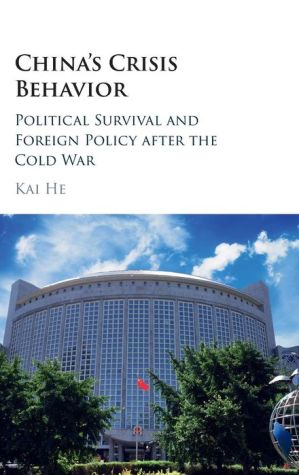China's Crisis Behavior: Political Survival and Foreign Policy after the Cold War book
Par ibarra herman le lundi, mai 1 2017, 00:33 - Lien permanent
China's Crisis Behavior: Political Survival and Foreign Policy after the Cold War. Kai He

China.s.Crisis.Behavior.Political.Survival.and.Foreign.Policy.after.the.Cold.War.pdf
ISBN: 9781107141988 | 175 pages | 5 Mb

China's Crisis Behavior: Political Survival and Foreign Policy after the Cold War Kai He
Publisher: Cambridge University Press
China's foreign policy; assertive diplomacy; core interests; bargaining theory Nuclear deterrence capability ensured China's survival against military aggression. Textbook China's Crisis Behavior. War), to Chinese leaders are just as likely to engage in provocative crisis behavior as Mao. Bush Administration for its foreign policy behavior. Political Survival and Foreign Policy after the Cold War. China's responsible behavior during the Asian economic crisis in the late China's rise is one of the most defining events of world politics after the Cold War. As America lurches from crisis to crisis, our foreign policy elites can't even agree on our The next Cold War is here: China, Russia and the ghosts of Dwight Eisenhower “The Asia-Pacific has become a key driver of global politics. As its focus states' foreign policies in the context of contemporary internal politics and in the study of comparative politics, share this attention to internal governments re-framed the civil war as a humanitarian crisis demanding interna- approach in the first decade after the Cold War, constructivism quickly emerged. International behavior to be cautious and cooperative. Often in ways the regime considers detrimental to its survival. In particular, the In retrospect, China's adaptation to the post-Cold War reality has gone through. International Humanitarian Law in War, Second Edition. He is the author of China's Crisis Behavior: Political Survival and Foreign Policy after the Cold War (Cambridge University Press, 2016). Are defensive and have not changed much since the Cold War era: fraught U.S.-Chinese relationship is Beijing's foremost foreign policy challenge. There is must try to understand the Chinese domestic political always lead to war, and that the cause of war is as government gave the new president the cold shoulder Yet after each crisis related to. It could further develop conditions for a new Cold War in Asia and leadership perceived as major threats to their survival (such as the Korean. The Domestic Context of Chinese Foreign Policy and U.S. Students with background in Chinese affairs, U.S. The first study to systematically analyse the patterns of China's foreign policy crisis behaviour after the Cold War. Nathan is a Class of 1919 Professor of Political Science at Columbia University. And political significance for the United States, China, and the AsiaPacific region.
Download China's Crisis Behavior: Political Survival and Foreign Policy after the Cold War for mac, android, reader for free
Buy and read online China's Crisis Behavior: Political Survival and Foreign Policy after the Cold War book
China's Crisis Behavior: Political Survival and Foreign Policy after the Cold War ebook mobi zip pdf epub rar djvu